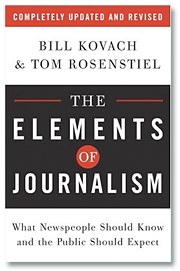
IN 2001, after three years of investigations and interviewing hundreds of journalists, leading media practitioners Bill Kovach and Tom Rosenstiel wrote The Elements of Journalism, now a reference point for what is good journalism.
One of Kovach and Rosenstiel’s principles was that a journalist’s first loyalty is to citizens. Not its owners, advertisers or even consumers, but “to a social obligation that at times overrides their employers’ immediate interests…” The authors also quoted former Washington Post publisher Eugene Meyer who said this: “In pursuit of the truth, the newspaper shall be prepared to make sacrifices of its material fortunes, if such a course be necessary for the public good.”
But whom did the Malaysian traditional media serve in their recent coverage of the Coalition for Clean and Fair Elections (Bersih 2.0) and its 9 July 2011 rally? What would the reporting have looked like if the media had lived up to their social obligation to inform the people fairly, comprehensively and accurately of Bersih-related events? And what did the coverage instead look like?
How our media performed
Here is some information that would have helped the public make up their own minds about Bersih 2.0. Against that is an assessment of how some of the traditional media performed.
* Bersih’s demands
What was needed: The most crucial piece of information about the planned Bersih march was probably this: What was Bersih marching for? What was it all about? Were their claims justified and legitimate? This would not have been difficult to discover — Bersih’s eight specific demands for a cleaner and fairer election process in Malaysia has been publicised through its website, press statements and public fora. Among others, Bersih’s demands are: a clean-up of the electoral roll; reform of the postal ballot; a minimum 21-day campaign period; and freer and fairer access to the media.
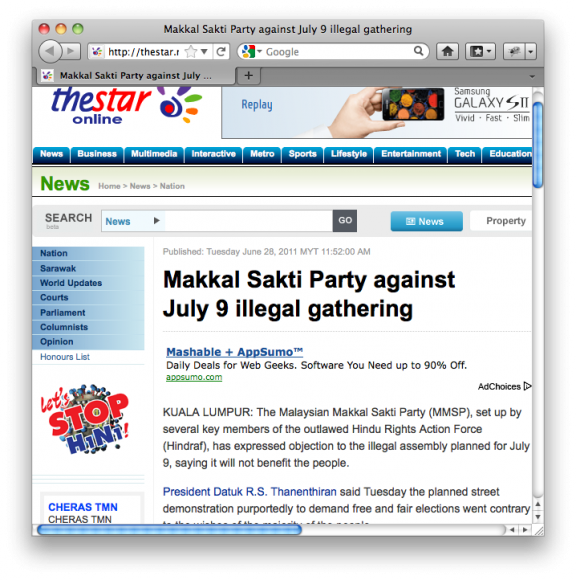
What was done: Newspapers hardly mentioned Bersih’s demands. As the police stepped up their pre-emptive action against Bersih’s planned peaceful rally, a Bernama report in The Star even stopped referring to the march as the Bersih rally. Instead, the report called it the “illegal assembly planned for July 9”. In the first mention, they also did not refer to Bersih by its full name, the Coalition for Clean and Fair Elections, thereby making it difficult for a casual reader to ascertain what the march was all about.
* The government’s concerns
What was needed: The Barisan Nasional (BN) government and the authorities demonstrated great concern over, even opposition toward, the planned march. This was purportedly because the walk was a threat to public order and national security. However, some historical context would have perhaps provided another perspective. The November 2007 Bersih march was held shortly before the March 2008 general election, which saw great opposition gains. Pakatan Rakyat politicians have pledged support for the second march. Additionally, in recent decades, the authorities under BN-rule have repeatedly used heavy-handed tactics to stifle street protests, especially when it involves criticisms against the government.
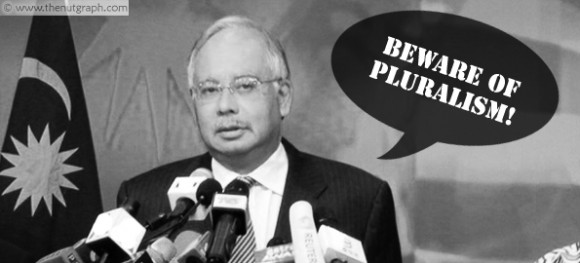
What was done: The traditional press provided ample column space to BN and the authorities to voice their fear-mongering concerns without any background provided. Previous rallies have created “chaos”, Home Minister Datuk Seri Hishammuddin Hussein was reported as saying. There would be “mob psychology” where people from different backgrounds could cause “anarchy”, said Prime Minister Datuk Seri Najib Razak. The rally organisers are “desperate”, want to stir up dissent and “seize power”, said Datuk Seri Dr Rais Yatim. The rally could cause “chaos, destruction to property, injuries and even the possibility of loss of lives,” Inspector-General of Police Tan Sri Ismail Omar was reported to have said.
The Star, in translating an Utusan Malaysia report, reproduced the label for the march as an “opposition-initiated” rally. On its own, it also declared that the civil society-led movement was “Opposition-initiated”. This was even though Bersih organisers have repeatedly stressed that Bersih 2.0, since it was launched, is entirely a civil society movement without political parties in its steering committee so that it can be completely independent.
* The legal position
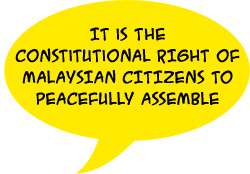 What was needed: The Federal Constitution is the supreme law of the land. Article 10(1) guarantees citizens’ rights to express themselves and peacefully assemble. Article 10(2) however allows Parliament to set restrictions it deems necessary and expedient in the interests of “security” or “public order”. One such restriction is the Police Act, which requires gatherings of three or more people to apply for a permit.
What was needed: The Federal Constitution is the supreme law of the land. Article 10(1) guarantees citizens’ rights to express themselves and peacefully assemble. Article 10(2) however allows Parliament to set restrictions it deems necessary and expedient in the interests of “security” or “public order”. One such restriction is the Police Act, which requires gatherings of three or more people to apply for a permit.
Lawyers and human rights organisations however have pointed out that restrictions cannot render the right illusory and requiring a permit could arguably go too far and be unconstitutional. There have been repeated calls, including by the Malaysian Human Rights Commission (Suhakam), to abolish the need for police permits for peaceful assemblies. A comprehensive media analysis on the relevant laws, with opinions from lawyers, the police, human rights activists and legal experts, would have been extremely useful to the public.
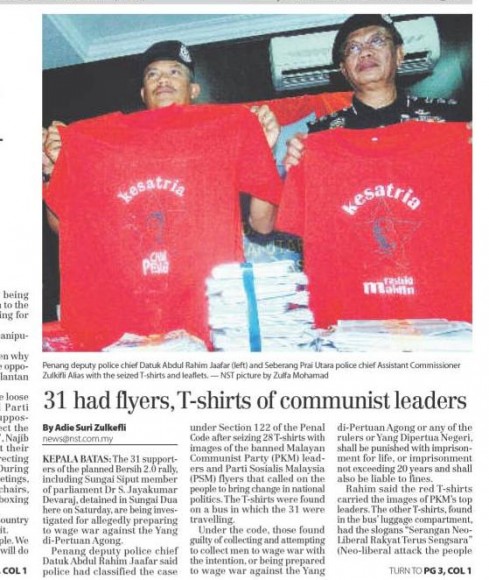
What was done: Illegal, illegal, illegal. News reports in The Star and New Straits Times simply assumed that the planned demonstration was illegal and reported it as such. They also reported Hishammuddin’s incredible declaration that Bersih t-shirts were illegal and the arrests of people in yellow t-shirts without any commentary on whether this had any legal basis.
Other worrying trends
Far from portraying a comprehensive account, newspapers such as Utusan Malaysia seemed to bend over backwards to demonise Bersih 2.0. Utusan also published sensational allegations about Bersih by relying on anonymous sources. One allegation stated that Bersih was being funded by foreign Christian organisations, a charge denied by Bersih 2.0 chairperson Datuk Ambiga Sreenevasan. Another said foreign agents possibly with communist links had infiltrated Bersih. And yet another Utusan report said Bersih was supported by non-governmental organisations that intended to overthrow the Malaysian government. No explanations were given as to why Utusan had to rely on anonymous sources, thereby putting the credibility of these stories in doubt.
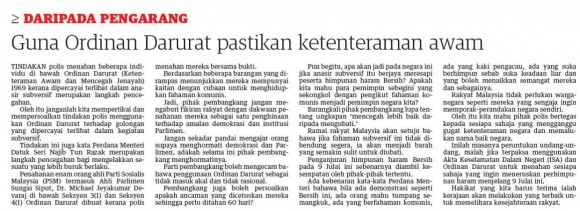
More worryingly still, an Utusan Malaysia editorial urged the government to violate human rights by detaining without trial those involved in Bersih under the Internal Security Act. Another editorial under the pseudonym Awang Selamat congratulated the police for using the draconian Emergency (Public Order and Prevention of Crime) Ordinance, which also allows for detention without trial, against six Parti Sosialis Malaysia (PSM) members.
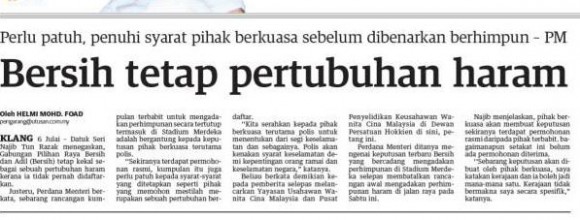
Perhaps Utusan editors may think differently, but wouldn’t it require a supreme stretch of the imagination to construe championing detention without trial as serving public interest first and foremost?
Bebas 1.0?
For certain, the threat of closure by the government and the pressure from political owners seriously hampers our traditional media’s ability to be loyal to citizens above anyone else.
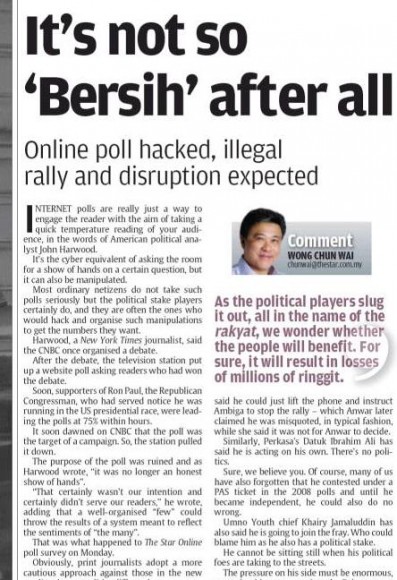
But it is alarming how in this instance, some newspapers completely abandoned their role in comprehensively informing citizens about an issue of great public interest. Instead, they provided skewed accounts, omitted to ask glaring and crucial questions, and even acted against public interest by condoning human rights violations.
This merely illustrates how essential Kovach and Rosenstiel’s principle of “first loyalty to citizens” is for good journalism. It also highlights how any other formula can destroy the media’s role in serving public interest, and its credibility. Perhaps, apart from a Bersih 2.0 rally, there is also a need for a Bebas 1.0 walk for greater press freedom? ![]()


Ruzaini says
A lucid analysis of the state of media freedom in Malaysia. Strongly support a movement to reform the media industry in Malaysia. A walk is an option, but perhaps a boycott against mainstream media is also a good choice?
It need not be antagonistic. It can be as simple as telling the newspapers owners and the public the reasons why the boycott is initiated, and what they can do so that the boycott would be lifted.
Alternatively, we may also come out with new tabloids, one which upholds the principles expounded by Bill Kovach and Tom Rosenstiel.
Who are “we”? Of course the civil society. However, maybe The Nut Graph may spearhead this project. Or Loyarburok perhaps?
neptunian says
Somehow, a lot of people still have the mistaken belief that Utusan is actually a newspaper. Pleeease….. wake up already!
Merah Silu says
Wow, Utusan Malaysia is not a newspaper? It is the first newspaper that I read everyday. Of course it promotes the views and the interest of Malays. Is that wrong?
For your information, that is the newspaper, to be exact, the Utusan Melayu, that promoted the idea of independence for this country. It has contributed a lot to this country, and the idea of being a nation. Jangan lah nak sindir-sindir unless you do not understand the history of this country.
JW Tan says
I think it’s a rag fit only for wrapping nasi lemak. But that’s because I like to get news and good news analysis from my newspapers. Editorialising, inaccurate reporting, rabid adherence to pro-establishment views, I can get in many places. A good newspaper should be thought-provoking, not just provoking.
Tan says
“I think it’s a rag fit only for wrapping nasi lemak.”
This kind of arrogance – assuming that something is not worth reading – could, I believe, well be one of the reasons why our country is in such deep turd. Utusan Melayu may be exactly as you described. But it is also a means of understanding how a large number of Malays think. Do you not feel it is important to understand how they think? Or is it only important for them to understand how you feel?
Some Malays feel they are being oppressed, driven out even, in/from their own land (no doubt the non-Malays feel the same). Do you not think it is important for you to know why, even if the reasons are nonsensical or unjustified?
Like Merah Silu, I read Utusan first thing every day. […] It is necessary reading. It’s also less painful reading the most unpleasant stuff first.
JW Tan says
I disagree with some of that. Not everything is worth reading – at some point one has to draw the line at reporting that strains credibility and sacrifices accuracy for editorial bias. To pretend otherwise is intellectually dishonest. I choose to draw the line at Utusan.
I also think that, after many years living in Malaysia, I understand very well the arguments and mentality (these don’t change!) of those who like and agree with Utusan. They haven’t been exactly shy about telling others have they?
Which is not to say I don’t read Utusan. I don’t read it often – low tolerance for poor news reporting – and I don’t pay for it. But I sometimes scan the odd article online or read it when it’s wrapped around my nasi lemak. There’s rarely anything of interest.
I agree that there’s some potentially useful information content in terms of what the Utusan message is and what it’s readers think. But the main reasons I read newspapers are to find out about the world and for intellectual pleasure. Utusan gives me neither.
old mousedeer says
The ruling clique, like LKY down south, is used to using the iron fist and, at the same time, practising deceit. First they hammer you with the iron fist, and then con you with promises they have no intention to keep. The non-Malays have experienced all these. After 55 years, they are fed up. All they want is change for the better – and that means kicking out the BN.
Savant says
This is actually a poor one sided article that attacks the old print and TV media, which are currently controlled by the ruling parties.
The article totally overlooks the online media that is dominated by the pro-opposition groups or the groups sympathetic to ethnic Chinese Malaysian or Christian causes. I would be surprised if this comment is posted because it is well known by many groups that pro-opposition websites actively censor comments that challenge their world view or journalistic ‘narrative.’
Bersih is a political tool used by the opposition and foreign Malaysians, mainly of the ethnic Chinese community. That has to be first admitted. If it weren’t they should publicly disavow participation of opposition leaders.
If you see the Bersih pictures and sites, you can see the faces that comprise the global Bersih movement.
Futhermore, there is very little online analysis of the alleged ‘virtues’ of the Bersih demands. I have tried to publish my point by point analysis of the Bersih demands, but they are rejected by pro-opposition online sites. Some of the demands are ludicrously outdated or impractical, while others are vague (e.g. stop corruption! No details given on how that could be achieved!).
The media issue is worth noting. Yes, the main print media is biased. But the online media is just as biased.
There should be a media mogul in Malaysia who sees the opportunity for fair, balanced and nonpartisan reporting. But I doubt he [or she would] take action.
I used to think that foreign media could do that, but I now doubt their capability. Al Jazeera was a bastion of fair media reporting, in my opinion. But it has lost my support when they covered Bahrain’s protests (which has sectarian undercurrents against the ruling sunni minority) halfheartedly. At the same time, they exaggerated the Bersih rally as if it were on par with the Thai rallies!
Ding Jo-Ann says
Thank you for your comment. Whether or not the online media is biased should not preclude a detailed analysis of the traditional media’s coverage of an event.
The traditional media is still the main source of news for many in Malaysia and is tightly controlled by government regulations such as the Printing Presses and Publications Act. The situation is slightly different online where internet users have a wide variety of choice when it comes to selecting which websites to read. There is no such choice for those who rely on the print media for information.
Additionally, Barisan Nasional parties own or control most of the television channels and newspapers. This monopoly of information through ownership and government regulation makes it so crucial for the traditional media’s coverage to be scrutinised.
Perhaps more importantly, which this article admittedly does not cover, is the scrutiny of publicly owned media such as RTM, which is not only government-controlled but also tax-payer funded.
Savant says
As long as those same tax payers vote the same party into office, the policy will not change. That is the fact and I am thankful for that.
As with the media issue, the opposition now tries to obfuscate the underlying political issue by trying to invalidate the entire voting process, claiming it is unfair and corrupted. Their claims are outlandish and smacks of politics.
What’s worse is the fact that online media supporting the opposition and the Bersih movement themselves have been receiving funds from foreign agents and organisations. It was admitted by the Bersih leader that she received foreign funds (http://www.themalaysianinsider.com/mobile/malaysia/article/Bersih-repudiates-foreign-Christian-funding-claim/ ) where the article states “Ambiga admitted to Bersih receiving some money from two US organisations — the National Democratic Institute (NDI) and Open Society Institute (OSI).”
Where do you get your funds from? At least the government has a mandate to protect the interests of the majority of taxpayers who vote them into power. Where is your transparency?
You should be glad that Malaysians get to read from your website and see an ‘alternative’. But I think Malaysians are beginning to wise up and see you are no better than the govt controlled media. In fact, you may be considered worse because you try to protect the interest of minorities (such as corporations, billionaires with delusions of grandeur and the market-dominant minority races).
JW Tan says
I’d be interested in seeing your analysis of Bersih 2.0’s demands. At the very least it would provoke an interesting discussion.
Nevertheless, if you’re seeking to convince others of your point, you ought to cease insulting them. “Foreign Malaysians” indeed. There’s no such thing.
ahmad says
Dear Ding Jo-Ann,
In my humble opinion the effect of mainstream media to the masses is diminishing. PRU12 produced the tsunami thanks to online media highlighting our sleepy fifth PM and his fourth floor boys. And since then, the effect of mainstream media steadily contracts, as seen by decreasing circulation of main newspaper. And TV news? These days increasingly people are tied to Facebook and Twitter and hardly have time for TV news.
The issue of mainstream newspapers being subjugated to ruling-party interests is not new. I believe thinking people will take Utusan news that is pro-BN with pinch of salt, similarly with Harakah news that is pro-PAS.
I have seen blogs and online portals from both political divides, and my perception is as far as Bersih is concerned, the eight demands are politically driven. The EC’s answers were convincing to me, and the issues are weaknesses rather than blatant manipulation. It does not warrant subjecting KLites to demonstrations that make life difficult for everyone.
Recently I checked a survey on FB whether you agree or not with Bersih being held, and more people were in disagreement. Furthermore, the Bersih 2.0 website was hardly convincing. Hardly any comments followed the statements. If it enjoys grassroots support, why so few/no comments?
I share Savant’s observation of little discussion post-Bersih2.0 concerning virtues of the eight demands on pro-opposition blogs. Most of them focused on trying to damage the reputation of the police by [highlighting] isolated cases of mishandling. Clearly the opposition uses Bersih 2.0 to score political brownie points, but personally I feel it backfired.
Ruzaini says
@Savant:
First and foremost I must state that I categorically disagree with your overall commentary on the article. You allege that the article is biased, yet you do not clarify further on the issue.
I don’t agree that the article is one-sided. Granted it did not refer to online pro-opposition controlled websites in the analysis, but that omission alone does not make the article biased. In fact, it is fairly acceptable since the comparison made is not between the regime-controlled mainstream media and pro-opposition blogs. The analysis is on the perceived standard of good journalism vs the practice of mainstream media in Malaysia.
On a second note, you also allege that the Coalition for Clean and Fair Elections (Bersih 2.0) promotes an agenda favourable only to one particular community. You then stop short from elaborating further. Without any supporting explanation or evidence, that is really an absurd allegation. This is simply because the demands of Bersih for fair, free and transparent electoral process can hardly be said to only favour one particular ethnic group.
I agree with you that to certain extent, Bersih 2.0 has been hijacked by the opposition coalition. Be that as it may, it does not deflect from the fact that Bersih 2.0 was initiated by civil groups which are apolitical. That is an important fact that I fear you fail to highlight. To summarily allege that Bersih 2.0 is a political tool of the opposition pact, purely on the basis that opposition politicians constantly claiming the movement as their own, is too ludicrous a claim.
To simply suggest that the demands of Bersih 2.0 are ludicrous is mind boggling, to say at best. I’m sure Bersih 2.0’s website contains many explanations of the movement’s demands.
I regret that your analysis on Bersih 2.0’s demands is rejected by the pro-opposition blogs. Perhaps you can try your luck here at The Nut Graph and Loyarburok? I believe these two sites are apolitical and nonpartisan at best.
savant says
It is your right to disagree. And it is your right to bear in your mind incorrect beliefs and irrational thoughts. However, any non-partisan view of this issue would reveal how flawed your view regarding this article. It is NOT a fair article. It is NOT a well-written one either.
As for the Bersih issue: Go to http://info-wars.org/2011/07/15/malaysias-bersih-the-facade-of-clean-elections/
As you can see from the link, it is not I or the ruling party making the accusation that Bersih is an opposition conspiracy supported by foreign agents . It is from an independent website, which is not associated with media moguls like conservative Rupert Murdoch , the Sulzberger family or the government.
Coming back to the issue of the article in question, it wants to denounce ‘traditional’ media and mentions The Star, NST and Utusan specifically. But why did the author cherrypick these? What about the Sun or Berita Harian and Harian Metro?
Then there is the careful omission of Chinese papers. Where is Sin Chew and China Press? These papers also play a role in maintaining the status quo.
The fact is there is blatant insincerity on the part of the ‘journalists’ that are online . The Nut Graph, Malaysian Insider, Malaysiakini and others just post anything critical of the government or that would cast the government in a bad light. But they hardly publish anything critical of the opposition. That is NOT journalism. And it does NOT serve the people (or the ‘rakyat’ as most Chinese I know love to hijack that word).
Funny how this article starts off by citing ‘The Elements of Journalism’ yet totally ignores the point of the book.
Also, I want to let you know, I have a point-by-point response of Bersih’s demands that exposes the hypocrisy and duplicity of the Bersih movement. I have already emailed the site admins and contributors. NONE have responded to me or indicated that they have read it. It is a 4,000-word response, so it can’t fit in this cheap comment section.
JW Tan says
Why not put it up somewhere and post the link? Or post a summary. If you can’t boil 4,000 words down, then you may well be rambling.
Savant says
TNG hasn’t posted my Bersih responses. I have tried to publish my succinct Bersih refutations. I wrote to all their contributers and editor with point by point analysis of Bersih’s demands and the flaws. But to no avail.
Standard of good journalism is a subjective issue and I know you are defending the author of the article. But your defense is poor. The article is incomplete and doesn’t even address the weaknesses inherent in any media, mass or alternative. Any issue can have multiple viewpoints, and it would arrogant to assume you can cover all of them fairly.
You refute my claim that opposition is using Bersih as ‘ludicrous’ but offer no defense. Opposition leaders have paraded themselves with Bersih leaders in the rally, in functions and even behind closed doors. Pictures and accounts are rife on the mass media and online. Any fool can find it.
Also, you contradict yourself. You categorically disagree with my overall commentary, but you agree with me that Bersih is ‘hijacked’ by the opposition coalition. Define ‘hijack’? Was Ambiga held with a boxcutter to her neck by Anwar and Mat Syabu like the 9/11 hijackers did to Flight 93 passengers?
Ellese says
Dear Savant,
What surprises me is that the call for fair, free and objective media is only for MSM. Why we can’t call for free, fair and objective media [in all forms] is bewildering and smacks of double standards.
You are right in your view of pro-opposition blogs. None I’ve come across can even defend Bersih’s stand. The most open pro-PR blog ended up name-calling me. I don’t have to use any harsh words at all to explain the situation. One PR supporter even called for my death and called others to kill me just because they couldn’t defend Bersih’s position. This is the sad reflection of our society and how these so-called Bersih supporters perceive freedom of expression.
Savant says
Dear Ellese,
I know what you mean. The national discourse has become so polarised. This trend is happening all over the world.
I used to be a pro-Opposition Malay man. But since working overseas I have seen the opposition make mistake upon mistake. It has made me change my mind.
Looking deeper at the the opposition brand of politics, it appears to me that they have assumed a ‘belief system’ around their views. They don’t hold their leaders or their media or their allies accountable. In fact, the same problems I saw in BN many years ago are now cropping up among the opposition. The emergence of dogmatic belief in the infallibility of their leaders and the righteousness of their ’cause’.
Kong Kek Kuat says
@ Savant
Oh… and the same problems you saw in BN many years ago have now disappeared? […]
JW Tan says
Ordinarily I would agree with some of your statements – all media should aim to be free and fair, although not necessarily objective. Media should be able to express editorial bias, as long as such bias is clearly stated upfront. Transparency is a better aim.
But Malaysia is not a free country, even less so where the press is concerned. Mainstream Malaysian papers that used to provide a countervailing viewpoint to pro-establishment papers like Utusan were eventually co-opted. I miss the old Star. What’s available now is a poor shadow of the coverage and editorial slant it used to have.
As long as the government refuses to allow freely opposing viewpoints in the MSM, then a demand for MSM to be free, fair and objective is reasonable (and even essential). There are lots of pro- and anti-establishment blogs and websites, so they only need to be free and fair. And transparent.
Savant says
The ‘freedom of the press’ tenet is always the adage used by proponents of unfettered speech. However, these same proponents fail to understand the corrosive role media has in dividing the public.
It is hard to strike a balance. And in many cases, the balance was never intended. Yes, the mainstream media doesn’t give airtime to the opposition. But what is the airtime they want? What does the opposition want? Their campaign slogans to be aired? Or do they want to air unsubstantiated claims against Rosmah about bejewelled rings or multibillion-dollar yachts allegedly bought by a Malaysian? By the way, Daily Mail UK is nothing but a tabloid rag, no better than News of the World.
There are more important things than online rumours for the MSM to focus on. The latest issue that the opposition wants to drum up is the French lawyer who was deported. I think it is absolutely correct for that to be done. Why would any sovereign nation let a foreign agent arrive on our land to make wild accusations or perform unwarranted investigations? He should seek conviction of French companies and French officials first before coming here. Plus, there is the matter of the International Criminal Court, where he can do his due diligence before interfering in Malaysian matters on Malaysian soil.
I think despite the Malaysian MSM failings, it is still far better in keeping things in perspective. Fox News and MSNBC in the US have started to diverge from one another. Each one plays with words to paint their political leanings as the obvious and correct view.
As for the US PBS network, they too have shown bias. Se http://en.wikipedia.org/wiki/Public_Broadcasting_Service#Political.2Fideological_bias
Objectivity is hard to maintain. Maybe the TNG editors should do a little soul-searching and print a pro-government article once in a while.
Andrew I says
Well, if most media are biased to you, maybe you should just stick to media which you don’t consider biased. Saves you all the angst.
I read The Star and they don’t publish my comments. No angst on my part.
JW Tan says
The Chinese papers covered the rally fairly accurately. Although they put out editorials which took stances against the rally, the one in NYSP at least did have relatively well-argued reasons. It still didn’t excuse the illegal actions of the police against the right of free assembly though.
If you believe this link however, even this balanced stance was too much for the government.
http://malaysiansmustknowthetruth.blogspot.com/2011/07/chinese-dailies-hauled-up-over-pro.html
Gopal Raj Kumar says
There is a great deal of selective perception and selective truths in this article and the book it advertises.
“One of Kovach and Rosenstiel’s principles was that a journalist’s first loyalty is to citizens”. Wrong. A journalist’s first and only obligation is his [or her] loyalty to the truth. Not to cloud it, not to colour it, and that’s clearly missing from Kovach and Rosenstiel’s thesis on the subject.
By relying on such a self-righteous creed and gratuitous advice on how and what to write a fiction of their minds, they place the primary objective of journalism somewhere else in the maze of subjectivity which they expect the uninformed and gullible reader to digest. Objectivity and truth are inseparable twins in journalism they ignore, a challenge to the truth.
Each of the so-called mainstream and alternative media in Malaysia in particular (though not exclusively a Malaysian phenomenon) has its biases and prejudices, writing for different causes and audiences.
The moment one forgets that objectivity and subjectivity are but the same imposter parading in a different shade singing at a different pitch and in a different key to suit its audience, ignorance establishes itself in the mind.
When a so-called alternate medium like Malaysiakini becomes the staple of a sector of the community, it is no longer alternative. It is mainstream. When one gets terminology so caught up in political syntax it becomes difficult to eliminate fact from fiction or to be objective in the true sense of the word.
When the so-called alternatives are so fanatical in their condemnation of what they see is establishment or ‘the other side’, they become their own worst nightmare, giving life to the idiomatic expression “art imitating life”.
One has to be careful in condemning what one disagrees with or dislikes to make sure the higher morality and virtues one espouses is not drowned in contradiction of one’s own conduct under pressure.